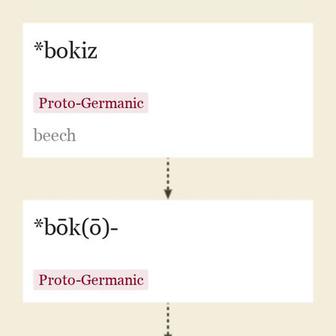biblio-
这个词源元素的意思是“书”或有时是“圣经”,源自希腊语 biblion “纸张,卷轴”,也是“作为更大作品的一部分的书”的普通词汇; 最初是 byblos “埃及纸莎草”的一种爱称。这可能来自于 Byblos,即从埃及纸莎草出口到希腊的腓尼基港口(现代黎巴嫩的杰贝勒; 对于意义演变,请参见 parchment)。或者这个地名可能来自于希腊语单词,然后可能是源自埃及。与 Bible 相比。拉丁语 liber(参见 library)和英语 book 也最终来自植物词汇。
biblio- 的相关词汇
"旧约和新约的圣经",早在14世纪就来自盎格鲁拉丁语 biblia,13世纪的古法语 bible "圣经",也指一般的大书,来自中世纪和晚期拉丁语 biblia "圣经"(中性复数被解释为女性单数),来自 biblia sacra "圣书"的短语,这是希腊语 ta biblia to hagia "圣书"的翻译。拉丁词来自希腊词 biblion "纸张,卷轴",也是“作为更大作品的一部分的书”的普通词汇; 参见 biblio-。
基督教经文在公元223年左右就被称为希腊语 Ta Biblia。 Bible 取代了古英语 biblioðece(参见 bibliothec),成为“圣经”的普通词汇。"任何权威书籍"的比喻意义始于1804年。Bible-thumper "严格的基督徒"来自1870年。Bible belt 指美国南部基督教原教旨主义者主导的地区,始于1926年; 可能是由 H.L.门肯创造的。
Her first husband was a missionary to China, and died miserably out there, leaving her with a small baby and no funds. Her second seems to have left her nearly as quickly, though under his own steam: her souvenir was another infant. For years she toured the Bible Belt in a Ford, haranguing the morons nightly under canvas. [H.L. Mencken, review of Aimee Semple McPherson's "In the Service of the King: The Story of My Life," The American Mercury, April 1928]
她的第一任丈夫是一位中国传教士,在那里痛苦地死去,留下了一个小婴儿和没有资金。她的第二任丈夫似乎离开得也很快,尽管是自己的力量:她的纪念品是另一个婴儿。多年来,她在一辆福特车上巡回演出,每晚在帐篷下向白痴们演讲。[H.L.门肯,《美国水银报》,1928年4月]
Walter Scott and Pope's Homer were reading of my own election, but my mother forced me, by steady daily toil, to learn long chapters of the Bible by heart; as well as to read it every syllable through, aloud, hard names and all, from Genesis to the Apocalypse, about once a year; and to that discipline — patient, accurate, and resolute — I owe, not only a knowledge of the book, which I find occasionally serviceable, but much of my general power of taking pains, and the best part of my taste in literature. ... [O]nce knowing the 32nd of Deuteronomy, the 119th Psalm, the 15th of 1st Corinthians, the Sermon on the Mount, and most of the Apocalypse, every syllable by heart, and having always a way of thinking with myself what words meant, it was not possible for me, even in the foolishest times of youth, to write entirely superficial or formal English .... [John Ruskin, "Fors Clavigera," 1871]
沃尔特·斯科特和蒲柏的荷马是我自己选的读物,但是我的母亲通过每天的刻苦劳动,强迫我背诵长篇章节的圣经,每年大约一次,从创世记到启示录,每个音节都要大声朗读,包括难读的名字; 我不仅因此了解了这本书,发现它偶尔有用,而且还有很多关于我的耐心、准确和决心的一面,以及我在文学方面最好的品味。...[O]nce knowing the 32nd of Deuteronomy, the 119th Psalm, the 15th of 1st Corinthians, the Sermon on the Mount, and most of the Apocalypse, every syllable by heart, and having always a way of thinking with myself what words meant, it was not possible for me, even in the foolishest times of youth, to write entirely superficial or formal English .... [约翰·拉斯金,《Fors Clavigera》,1871年]

中古英语 bok,源自古英语 boc “书,写作,书面文件”,通常指代(尽管存在语音困难)原始日耳曼语 *bōk(ō)-,源自 *bokiz “山毛榉”(源头还包括德语 Buch “书”和 Buche “山毛榉”; 参见 beech),意思是山毛榉木板上刻有符文; 但也可能来自山毛榉树本身(人们仍然在上面刻下自己的名字缩写)。
拉丁语和梵语也有以树木名称为基础的“写作”单词(分别是“桦树”和“灰树”)。并且比较一下法语 livre “书”,源自拉丁语 librum,最初是指“树皮”(参见 library)。
这个意思在早期中古英语时逐渐缩小为“一个由许多页面组成的书面作品,被固定在一起并装订”,也可以是任何形式的“文学作品”,无论有多少卷。后来也包括“装订的页面”,无论是否有文字。在19世纪,它也可以指“杂志”; 在20世纪,它是电话簿。
The use of books or written charters was introduced in Anglo-Saxon times by the ecclesiastics, as affording more permanent and satisfactory evidence of a grant or conveyance of land than the symbolical or actual delivery of possession before witnesses, which was the method then in vogue. [Century Dictionary]
书或书面特许证书的使用是由教士在盎格鲁-撒克逊时期引入的,因为它提供了比当时流行的在见证人面前象征性或实际交付财产的证据更为持久和令人满意的证据。[世纪词典]
从公元1200年开始,“更大作品的主要分部”。意思是“歌剧的歌词”来自1768年。下注 book “下注记录”来自1812年。意思是“犯罪指控总数”来自1926年,因此俚语短语 throw the book at(1932年)。Book of Life “被选为永生的人名单”来自14世纪中期。Book of the month 来自1926年。按照规则做某事 by the book 来自1590年代。
- Byblos
- library
- parchment
- bibliography
- biblioklept
- bibliolatry
- bibliology
- bibliomancy
- bibliomania
- bibliopegy
- bibliophile
- bibliophobia
- bibliopole
- bibliothec
- bibliothecary